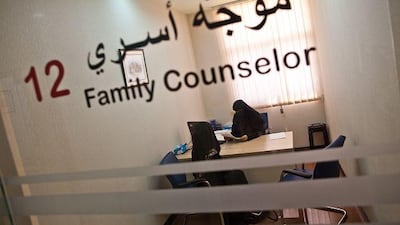There is no irony in the fact that Wedad Lootah has been fighting for women's sexual rights from behind full niqab. A marriage counsellor in the family guidance department at Dubai Courts, Ms Lootah bases her advice firmly on the teachings of the Quran.
And her goals are much less about sexual liberation than they are about helping married couples avoid divorce. "My subject is not sex; people always misunderstand that," she explains. "I'm trying to guide people about how to satisfy each other and save society from illegal relationships - girlfriends, boyfriends. We're talking about Islam. We're not talking about sex." The reality is that she and the individuals and couples she meets do talk about sex.
But they do so within the parameters of marriage counselling, guided by the rules and principles dictated in the Quran. If the Quran did not figure so largely in her work, she would probably not have been personally appointed by Sheikh Mohammed bin Rashid, Vice President of the UAE and Ruler of Dubai, as the first and only female family counsellor at the courts; and it is very unlikely that her recent book, Top Secret: Sexual Guidance for Married Couples, would have been published in this country.
After all, subjects discussed within its pages range from the female orgasm to the importance of communication within a marriage. According to Islamic tradition, Ms Lootah explains, marriage is a three-step process. It begins with the selection of the two people who will potentially marry. If the families agree on the union, it is confirmed legally by signing a written agreement. "Then the marriage is legal, but it is without sex. That's not until the wedding," she says.
"The Prophet Mohammed, peace be upon him, said before you marry, you need to see each other, you need to understand if you like each other. "I advise people to visit each other before the wedding, spend time together, get to know each other." Ms Lootah sees herself as neither provocative nor revolutionary; her book, an extension of her work, is meant only to help maintain the strength of the traditions of her country and culture. Nothing she advocates or condemns diverges from the Quran; which is why she was able to have an imam give her book his blessing long before it was published.
"Sex is a big part of marriage. Mostly it's women who come in to see me. And they're here because the men don't always understand that they have responsibility in the marriage beyond working: they have a responsibility to make sure the wife gets pleasure. And if he has two or more wives, it has to be equal among them all." Ebullient and congenial, Ms Lootah is well aware that being able to do what she does, where she does it, makes her the exception rather than the rule.
But her openness about a topic sometimes considered taboo within Islamic culture has not been universally well received. Death threats and accusations of blasphemy followed the January release of her book. Most of the recent onslaught originated in the Gulf, she says. Ms Lootah's experience with threats and opposition began in 2004 after an interview on Al Arabiya television; their numbers have grown since then in tandem with her popularity and success.
In her mind, though, the ever unflappable Ms Lootah believes what she is doing is right and important. The idea of the book came to her in 2006 after a series of meetings with women whose stories about marital relations shocked her. The more stories she heard, the more convinced she was that she needed to begin research and get a book together for distribution in the UAE. "One couple lived together for 35 years, they had children, and in discussion I found that the woman had had no sexual pleasure in all that time," she says.
Clearly, Ms Lootah says, there is a demand for the kind of service she provides. And as sex is so little discussed, often people's questions go unasked and unanswered. "This is important because sex is an important part of marriage, that's in the Quran," she says. "But not everyone I see is Muslim. I see all religions, all nationalities. But mostly women." The number of people she sees has increased steadily over the nine years she has worked as a counsellor. Now she has about five or six appointments a day.
"From 2001 to 2004 it was almost always on the phone; couples were ashamed to talk, or they would talk but they wouldn't reveal everything," she says. "Since 2004, when I went on Al Arabiya and started giving lectures, and then the book, now people know there is someone who will listen. Even the most religious couples tell me everything now." Born and raised in Dubai, Ms Lootah has been married for 21 years and has three children.
Her marriage is strong, she says, and her husband is "very supportive, very proud" of her. Some of her best moments are when people she has counselled come back and thank her for saving a marriage that at one point seemed doomed. In addition to a lack of communication, Ms Lootah says, lack of variety or too much routine can hurt a marriage because the spark begins to fade. Other than getting to know each other as much as possible before marrying, her advice is relatively simple and straightforward.
"My advice for married women is to buy lots of dresses. Look beautiful. Be clean. Use the perfume. "I give the same advice to men: be like what you want your wife to be like. Brush your teeth." Above all, she says, when it comes to the bedroom, couples should remember variety is the spice of life. jhume@thenational.ae

